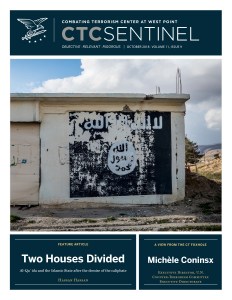From the Editor
With the collapse of the Islamic State’s territorial caliphate, there has been much uncertainty over how the global jihadi movement may evolve in the future. In our feature article, Hassan Hassan argues that rather than on the cusp of a period of mergers or takeovers, the global jihadi movement is, for the foreseeable future, likely to be led by two distinct and rival groups. According to Hassan, differences in doctrine and approach between the Islamic State and al-Qa`ida have hardened as a result of developments in Syria and neither group is on the brink of fracturing or accepting the legitimacy of the other.
Our interview is with Michèle Coninsx, the Executive Director of the Counter-Terrorism Committee Executive Directorate (CTED) at the United Nations. Among her office’s main tasks are assessing the counterterrorism measures in the 193 U.N. member countries, analyzing CT trends, and rendering expertise where needed. She says, “now more than ever, local, national, and regional measures are essential but not sufficient. We need that extra layer, and that’s exactly what the United Nations is offering.”
Cole Bunzel examines an ideological rift that has emerged within the Islamic State on the question of takfir (excommunication), which has led to infighting and the arrests of ‘scholars’ within the group. He argues that with Abu Bakr al-Baghdadi finding it increasingly difficult to keep the dispute in check, the ideological integrity of the Islamic State is being undermined. Jami Forbes warns al-Qa`ida’s North Africa- and West Africa-based affiliates are advancing on goals set out in an al-Qa`ida playbook discovered by journalists in 2013.
Paul Cruickshank, Editor in Chief
 Skip to content
Skip to content

